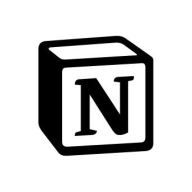

Trello and Notion both compete in the project management and productivity software categories. Notion seems to have the upper hand due to its high customization and versatility, which can be more beneficial for users seeking a comprehensive organizational tool.
Features: Trello is recognized for its simplicity and intuitive drag-and-drop functionalities, visual task management via Kanban boards, and effective workflow visualization. Notion sets itself apart with high customization capacities for organizing databases, notes, and workflows within a single platform and is especially valued for its ability to link data.
Room for Improvement: Trello could enhance its automation features, tracking capabilities, and customization options, as well as reduce the overwhelming nature of its notification system. Notion could improve its mobile app, expand its color palette, enhance customer support, and include more automation capabilities within its database functionalities.
Ease of Deployment and Customer Service: Trello provides multiple deployment options like hybrid, public cloud, and on-premises, offering flexibility. Its user-friendly design reduces the need for technical support. Notion mainly uses public cloud options and could improve its customer service responsiveness.
Pricing and ROI: Trello offers a competitive pricing structure with a free variant meeting several user needs, though additional features necessitate higher-tier subscriptions. Its value is significant for organizing tasks but costs can escalate with increased users. Notion provides an extensive free plan with affordable advanced features, beneficial for individual users or small teams, offering a good return on investment particularly for comprehensive data management.


Notion is an all-in-one workspace that enables teams to collaborate, organize, and manage their work effectively. Its primary use case is to streamline project management, knowledge sharing, and task tracking. With its versatile functionality, Notion allows users to create and customize databases, wikis, and documents, making it a powerful tool for organizing information.
The most valuable functionality of Notion lies in its flexibility and ease of use. Users can create and link various types of content, such as text, images, files, and even embed external resources. This enables teams to centralize their work and collaborate seamlessly, eliminating the need for multiple tools. Notion's drag-and-drop interface and intuitive editing features make it accessible to users of all technical backgrounds.
Notion helps organizations by fostering transparency, improving productivity, and enhancing knowledge management. By providing a centralized platform for collaboration, teams can easily access and contribute to shared projects, reducing communication gaps and ensuring everyone is on the same page.Trello is the visual collaboration tool that creates a shared perspective on any project. Trello’s boards, lists and cards enable you to organize and prioritize your personal and work life in a fun, flexible and rewarding way.
We monitor all Project Management Software reviews to prevent fraudulent reviews and keep review quality high. We do not post reviews by company employees or direct competitors. We validate each review for authenticity via cross-reference with LinkedIn, and personal follow-up with the reviewer when necessary.